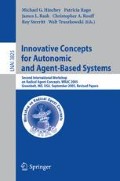Abstract
Industrial need new technologies to make evolved methods, strategy and capacity. Decision-making plays an important role in the case of the robot evolving in an instable environment, and enables us to decreasing the human factor in the control system. This paper presents a model based on brain construction to give a restricted emotion to a machine in order to control a multitude of entities. Emotion permits to make a rapid decision in a hostile environment. The method used to build this system is based on Massive MultiAgent System (Massive MAS). It enables us to have a vast number of entities with an asynchronous communication.The morphologic aspect is used to observe the agents behavior with the aim to generate a restricted emotion in order to make an action plan.
Access this chapter
Tax calculation will be finalised at checkout
Purchases are for personal use only
Preview
Unable to display preview. Download preview PDF.
References
Cardon, A.: Modéliser et concevoir une machine pensante. Vuibert (2004)
Bechara, A., H.D., Damasio, A.: Emotion, decision making and the orbitofrontal cortex. Cerebral Crotex 10 (2000)
Lerner, J., Keltner, D.: Beyond valence: Toward a model of emotion-specific influences on judgment and choice. Cognition an Emotion 14, 473–493 (2000)
Roy, P.V.: Oz/mozart environment (2002)
Roy, P., Haridi, S.: Concepts, Techniques, and Models of Computer Programming. MIT Press, Cambridge (2004)
Camus, M., El-Kadhi, N.: Generic simultor environment for realistic simulation – autonomous entity proof and emotion in decision making. Journal of Systemics, Cybernetics and Informatics 2 (2004)
Purves, D., Augustine, G.J., Fitzpatrick, D., Katz, L.C., LaMantia, A.-S., McNamara, J.O., Williams, M.S.: Neurosciences. De Boeck Universite (2003)
Cardon, A.: Conscience artificielle et systèmes adaptatifs. Eyrolles (2000)
Kolb, N., Whishaw, I.: Cerveau et Comportement. De Boeck Universite (2001)
Campagne, J., Cardon, A.: Using morphology to analyse and steer large multi-agents systems at runtime. In: Selmas 2004. IEEE, Edinburg (2004)
Cardon, A.: Design and behavior of a massive organization of agents. Design of Intelligent Multi-Agent Systems, Human-Centredness, Architectures, Learning and Adaptation 162, 133–190 (2004)
Channouf, A., Rouan, G.: Emotions et Cognitions. De Boeck Universite (2002)
Thom, R.: Modèles mathématiques de la morphogenèse. Christian Bourgois (1989)
Campagne, J.: Morphologie et système multi-agent. PhD thesis, Université Pierre et Marie Curie draft (2005)
Author information
Authors and Affiliations
Editor information
Editors and Affiliations
Rights and permissions
Copyright information
© 2006 Springer-Verlag Berlin Heidelberg
About this paper
Cite this paper
Camus, M., Cardon, A. (2006). Towards an Emotional Decision-Making. In: Hinchey, M.G., Rago, P., Rash, J.L., Rouff, C.A., Sterritt, R., Truszkowski, W. (eds) Innovative Concepts for Autonomic and Agent-Based Systems. WRAC 2005. Lecture Notes in Computer Science(), vol 3825. Springer, Berlin, Heidelberg. https://doi.org/10.1007/11964995_3
Download citation
DOI: https://doi.org/10.1007/11964995_3
Publisher Name: Springer, Berlin, Heidelberg
Print ISBN: 978-3-540-69265-2
Online ISBN: 978-3-540-69266-9
eBook Packages: Computer ScienceComputer Science (R0)

